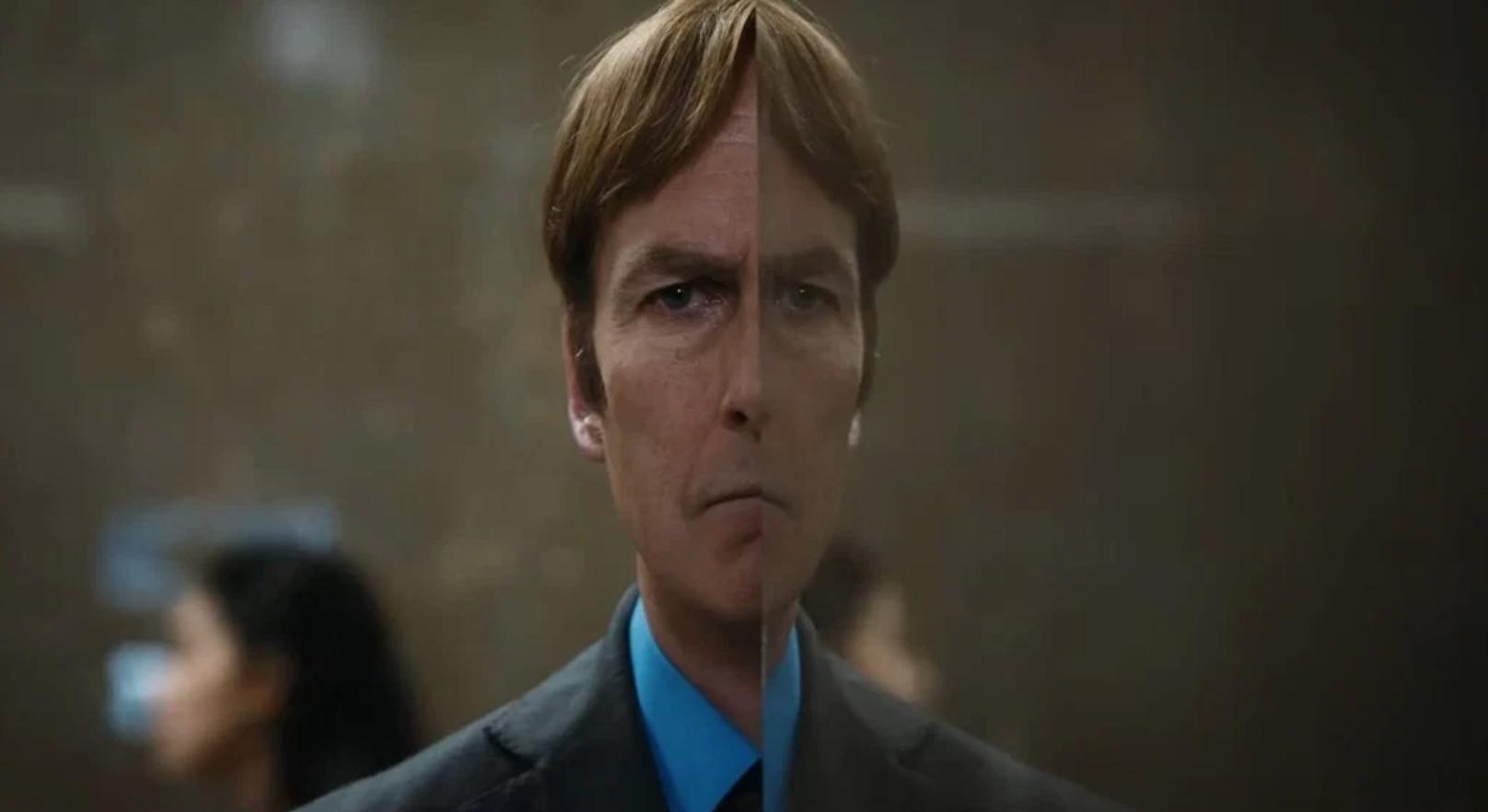If a show reveals its episode titles, directors, and writers ahead of an upcoming season, it’s possible to infer which installments might rise to the top of the critical pile. For Better Call Saul’s fifth and penultimate season, there were a few potential doozys to look forward to—or, in the spirit of this incredibly bleak series, anticipate with overwhelming dread. The title of the forthcoming finale, cowritten by cocreator Peter Gould, is called “Something Unforgivable,” making it of a piece with a pair of Season 4 episodes—“Something Beautiful” and “Something Stupid”—that showed fractures in Jimmy McGill and Kim Wexler’s relationship. It would be an understatement to say I’m terrified about what’s in store for Kim in the next couple of weeks.
But before we arrive at “Something Unforgivable,” Better Call Saul has strung together a trio of episodes whose titles did, unsurprisingly, portend to some worrying developments. The terrific sixth episode, “Wexler v. Goodman,” presaged more strain on the Kim-Jimmy relationship, as Jimmy-as-Saul blindsides his girlfriend in a legal dispute with Mesa Verde. Jimmy’s betrayal should’ve been the final straw; instead, after laying out all the ways staying together is a horrible and self-destructive idea, Kim shockingly proposes getting married. Their wedding, an anticlimactic affair in which goddamn Huell served as witness—Jimmy assures him it’s more of a legal arrangement so that Kim has spousal privilege, essentially giving them legal immunity against each other in court—opens the seventh episode, “JMM,” which theoretically stood for our antihero’s full name: James Michael McGill. (Kim previously gave Jimmy a briefcase with the initials as a gift, not knowing he’d practice law under the name Saul Goodman.)
But the initials “JMM” held more than one meaning. Jimmy contends it’s his legal motto—Justice Matters Most—but the catchphrase is so cringeworthy and insincere that he has a hard time even saying it aloud. Lalo Salamanca, Jimmy’s newest and most dangerous client to date, offers an alternative that might as well be the Saul Goodman mantra: Just Make Money. But Just Making Money comes with a moral price; Jimmy is representing a cartel boss and a killer. He is barely able to look at the grieving family of the slain TravelWire employee from Season 4 before flipping into Saul Mode. This unstable duality was beautifully evoked in this instant classic shot of Jimmy peering at the devastated family:

When his moment of introspection is interrupted by Howard Hamlin—who confronts Jimmy about throwing bowling balls at his Jaguar and sending hookers to his work lunch—we get what should be the entirety of Bob Odenkirk’s Emmy reel. “Jimmy, I’m sorry you’re in pain,” Howard says with genuine empathy, triggering Better Call Saul’s equivalent to Walter White’s iconic “I am the one who knocks” speech. Saul Goodman takes full control for a moment, and gives Hamlin a verbal lashing that is simultaneously pathetic and brutal to watch. (“I travel in worlds you can’t even imagine! You can’t conceive of what I’m capable of! I’m so far beyond you! I’m like a god in human clothing! Lightning bolts shoot from my fingertips!”)
Traces of Jimmy McGill are becoming harder to find, but he hasn’t totally been subsumed by Saul Goodman. Unfortunately, that leads us to “Bagman.” Like the others, I had Monday night’s eighth episode circled from the onset for a very obvious reason: “Bagman” was written by Gordon Smith (he did the excellent, Emmy-nominated Season 3 episode, “Chicanery”) and directed by Vince Gilligan, the mastermind behind the Breaking Bad universe. Gilligan doesn’t direct on Better Call Saul very often—though he did helm the penultimate episode last season, highlighted by Jimmy and Kim’s parking lot showdown—so it’s an easy bet to assume shit would hit the fan. Boy, did it ever.
“Bagman” largely focuses on Jimmy’s latest turn toward becoming a “friend of the cartel.” The judge sets a $7 million bail for Lalo, who believes the inconspicuous Jimmy would be the perfect candidate to pick the cash up from the Cousins across the border. (Plus, Lalo doesn’t trust any of his cartel lackeys to handle that much money without running away with it.) Jimmy is reluctant to do the favor, but then the Saul side of his brain kicks in—he wants a $100,000 commission for the trouble. The hardest thing is convincing Kim—part of their marriage is an agreement that Jimmy tells her everything, even if it’s something she’d disapprove of—that this isn’t a god-awful idea. “I don’t like this,” she says, trepidation in her eyes. “I don’t want you to do it.” He hugs Kim, a move that combines his sincere affection for her with his desire to put an end to the discussion. We’ve gotten to the point that Jimmy can openly discuss picking up millions of dollars of cartel money in front of Kim, his wife, which feels like a splash of cold water.
Jimmy collects the cash from the Cousins in the middle of nowhere—it was a true joy seeing the Breaking Bad universe’s chattiest character crossing paths with two stoic emissaries of death—but the thrill of a $100,000 payday is short-lived. Unknown assailants were tipped off about Jimmy’s pickup, and are about to walk away with the money and put a bullet in the lawyer’s head when Mike Ehrmantraut ex machina begins picking them apart with a sniper rifle. One of the men escapes in the area’s only car not riddled with bullet holes, leaving Jimmy and Mike to travel through the New Mexico desert on foot. (They also can’t follow the roads for fear the getaway gangster will show up again, finish the job, and get the $7 million.)
Jimmy and Mike’s odyssey is The Sopranos’s “Pine Barrens” by way of the desert, with a visual palette reminiscent of the Coen Brothers’ classic No Country for Old Men. There are countless One Perfect Shot–worthy moments on display in an episode that feels like quintessential Breaking Bad—an uncut Gilligan gem. Better Call Saul has largely thrived by trying not to emulate its predecessor, but the closer the spinoff has gotten to the original series’s timeline, the more likely it seems the use of Breaking Bad–like visuals and vibes will appear. The gangland half of Better Call Saul has always coexisted with the drama in New Mexico courtrooms; now, the side of the series that leads Saul to meet Walter White threatens to swallow it whole.
Because of how much ground they have to cover, Jimmy and Mike must spend the night in the desert. There’s no cell service, and Jimmy knows Kim must be worried sick; he tells Mike that she’s aware of what he’s doing. “She’s in the game now,” Mike says, which is both true and what Better Call Saul fans dread to hear. “She’s not in the game, all right?” Jimmy says, mostly to reassure himself. “She’s not even game-adjacent. I just told her the truth—a little slice of the truth, that’s all.”
Kim-related anxiety is a persistent feeling among viewers, but I’ve always thought the real danger lies in Jimmy corroding her morals more than, like, the character getting caught in a drive-by. But “Bagman” quashes any hope Kim could escape Better Call Saul without infiltrating the gangland side of the series. Kim confronting Lalo in jail is the most gasp-inducing moment of an episode that also includes a shoot-out. She’s in the game. The only tip from Rhea Seehorn—who continues to give the single best performance on television; Nick Offerman thinks she belongs on acting Mount Rushmore—that Kim is absolutely mortified comes from, again, her eyes. They’re swelling with fear—for Jimmy, for herself, and for the slippery slope of being, as Lalo puts it, “Mrs. Goodman.”
Nevertheless, Kim asks where Lalo sent Jimmy so she can go look for him. “So you’re his wife and you … love him!” Lalo says, like he’s only just realizing that people can make sacrifices for those they care about. (On a show with so many powerhouse performers, Tony Dalton is outstanding as the textbook definition of a charming psychopath.) While he refuses the offer, Kim making herself known to Lalo can only spur more trouble for her and Jimmy.
Thanks to Saul Goodman’s introduction in Breaking Bad, when Walt and Jesse Pinkman kidnap the lawyer and take him out to the desert, we know this arrangement with Lalo will end terribly. “Siempre soy amigo del cartel!” Saul pleads to them on that series, believing, at first, they were sent by Lalo. He also name-drops Nacho Varga, who is currently caught in the middle of Lalo and Gus Fring’s shadow war, which suggests he’ll have an important part to play in the events leading up to Breaking Bad. That Better Call Saul has mined this much out of a couple lines of seemingly throwaway dialogue from its predecessor speaks to the universe’s love of, and commitment to, details.
In “Bagman,” those details are the elements of Jimmy’s life that he loses, or confronts, in the desert. He must abandon his beloved, beat-up Suzuki Esteem, which said as much about the character’s personality as the Pontiac Aztek–cum–Chrysler 300 did about Walter White’s. A bullet goes through Jimmy’s World’s 2nd Best Lawyer thermos, another tie to Kim—she cheekily wrote the “2nd” in permanent red marker—that isn’t seen from his mug in Breaking Bad. He carries around the water bottle (filled with his own piss) from his brief stint at the law firm Davis & Main, the best chance Jimmy had of a legitimate career. (It feels like eons ago, doesn’t it?) And finally, there was Jimmy’s refusal to use one of Mike’s space blankets for warmth for the cold desert night—a reminder of his late brother Chuck, who wrapped himself in those things like a suit of armor.
It is perhaps that initial refusal, more than anything else, that shows the old Jimmy McGill is still in there somewhere. Even as Saul Goodman takes over, Jimmy still has to hide from the pain of being partly responsible for his brother’s death. But the way Jimmy loses these parts of himself in the desert is like a snake shedding its skin. After Jimmy finally makes use of the space blanket, shimmering in the sun, to lure the last remaining gangster toward him so that Mike can take him out, he leaves it lying on the desert floor. This wrenching odyssey appears to imply the inevitable. Jimmy McGill died in the desert; only Saul Goodman remains.
This is, more than anything, another serious red flag for Kim, who fell in love with (and MARRIED) the side of the character that’s slipping away. What goes down in the final two episodes of the season is gonna be brutal; I’m not emotionally prepared for the something unforgivable in “Something Unforgivable” in two weeks’ time. But as a television experience, the fifth season of Better Call Saul is throwing a perfect game and keeps one-upping itself—it is, without hyperbole, on course to being one of the best pieces of art I’ve seen. I would put these eight Better Call Saul episodes up against any season of Breaking Bad or the second seasons of Succession and Fleabag.
This show is a masterpiece still in the process of cementing its legacy—not just as a prequel that’s equally as compelling as its all-time great parent series, but as one of the last shows in the great wave of antihero dramas that’s defined this century of television. And if we just watched Better Call Saul’s equivalent to “Pine Barrens,” I can only imagine what happens once we get to its “Ozymandias.” When that moment arrives, I’ll be thinking of the evocative dissolution of Jimmy McGill in the desert, and Saul Goodman’s hollow declaration that he’s a god in human clothing. In the moral universe of Better Call Saul, justice still matters most.
An earlier version of this piece misstated the title of the upcoming season finale.
